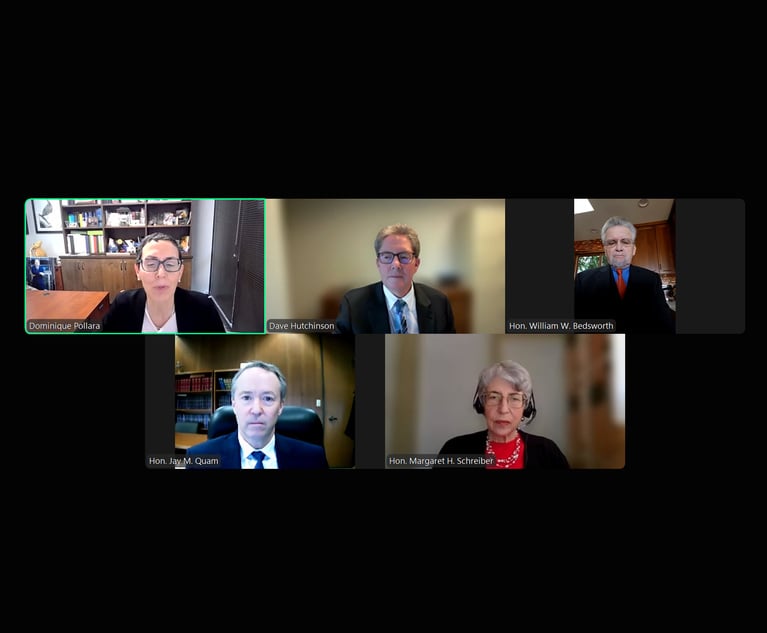 Hilary Weddell, with McManis Faulkner.
Hilary Weddell, with McManis Faulkner.California Employers' Ability to Test for Marijuana Post-Proposition 64
California became the first state to legalize medicinal marijuana in 1996, and 20 years later became one of the few states to legalize recreational marijuana. The resulting societal shift in cannabis use and its acceptance has complicated the regulation of cannabis in the workplace.
February 04, 2020 at 03:10 PM
6 minute read
California became the first state to legalize medicinal marijuana in 1996, and 20 years later became one of the few states to legalize recreational marijuana. The resulting societal shift in cannabis use and its acceptance has complicated the regulation of cannabis in the workplace. Proposition 64—which legalized the recreational use of marijuana in California—expressly recognizes an employer's right to "maintain a drug- and alcohol-free workplace" and to have "policies prohibiting the use of marijuana by employees and prospective employees." Thus, cannabis is often likened to alcohol; although consumption of alcohol is legal for those over the age of 21, employers may prohibit drinking during work hours and discipline any employee who comes to work intoxicated. But unlike tests for alcohol, there is no way to test whether a person is currently impaired from marijuana use. In fact, a regular user may test positive for marijuana weeks after the individual last used the drug. So when may employers test employees for marijuana? When should an employer test?
|Employer's Ability to Screen for Cannabis Use
Proposition 64 does not prohibit or limit an employer's ability to test for marijuana use. In California, employer drug testing programs are limited by the state's constitutional right to privacy. Although employment drug testing programs implicate this privacy right, they are not necessarily improper. Instead a program is judged on a case-to-case basis using a "reasonableness" balancing test that weighs the gravity of intrusion on an employee's privacy versus the validity of the employer's reason for the drug testing. California courts recognize that current employees, who have a work history the employer may use to evaluate their performance, have a stronger privacy claim than applicants.
California courts have upheld an employer's right to conduct "suspicionless" pre-employment drug testing. Best practices for a pre-employment drug testing policy include:
- A test that applies to all applicants in similar positions, and that does not single out certain applicants based on protected characteristics such as race or disability.
- A requirement that applicants receive prior notice of the drug test.
- A test that is conducted by medical personnel in a private environment.
- A requirement that the applicant's medical information and test results are not provided to the employer. Instead, employers receive a "suitability rating" thath does not disclose which part of the test the applicant failed.
- A test that is given to an applicant after a real job offer has been made (i.e., the employer has evaluated all nonmedical matters, such as, background checks and reference checks) and before the commencement of job duties.
Despite the legalization of cannabis in California, an employer maintains the right to refuse to hire an applicant who tests positive for marijuana, even if the drug is legally prescribed for a disability. However, because of the increase in recreational use of cannabis and the corresponding uptick in applicants who are testing positive for marijuana, employers in some industries are having a hard time finding qualified applicants who can pass a drug screen. Thus, some employers are moving away from pre-employment screening for marijuana for positions that are not safety-sensitive.
As for testing current employees, employers may require an employee to undergo a drug test as long as it is based on reasonable suspicion backed by objective and legally sound facts. According to the U.S. Court of Appeals for the Ninth Circuit, reasonable suspicion may be based on the following factors:
- A pattern of abnormal conduct or erratic behavior;
- Observable phenomena such as the smell of marijuana, red eyes or a distant gaze;
- An arrest or conviction for a drug-related offense while employed;
- Information from reliable sources or information independently corroborated; or
- Evidence that an employee tampered with a previous drug test.
Random drug testing of current employees is highly controversial, and courts have upheld random testing only for very safety-sensitive positions. Some federal authorities require California employers to establish a controlled substances and alcohol testing program that includes random testing. Unless you are required to randomly test or to have employees in very safety-sensitive positions, it is not advisable to randomly test for drugs. And some localities in California, such as San Francisco, have ordinances that prohibit employers from randomly testing employees for drugs except in limited circumstances.
|No Duty to Accommodate Medicinal Use of Cannabis
Although California employers have no duty to accommodate medicinal use of marijuana in the workplace, employers should tread carefully. While an employer may act adversely against an employee for his illegal drug use—which is not protected under the ADA—the employer may not subject the employee to an adverse action because of the underlying disability.
It is unclear whether California will join the movement to require employers to provide reasonable accommodations to medical cannabis users. During the 2017-2018 California legislative session, a bill was proposed that would have provided that the medical use of cannabis by a qualified patient with an identification card is subject to a reasonable accommodation by an employer. The bill would not have prohibited an employer from firing or refusing to hire a person if it "would cause the employer to lose a monetary or licensing-related benefit under federal law or regulations." The bill also would not have prevented an employer from firing, or disciplining, an employee who was impaired during work hours because of marijuana use. The bill did not make it out of committee, and it has not been re-introduced as a new bill.
|Employers Should Evaluate and Update Their Policies
With the legalization of recreational marijuana, now is the time for employers to re-evaluate their substance-abuse and drug-testing policies to be sure they align with the company's position on marijuana use. Policies should be updated to expressly identify marijuana as a prohibited substance, rather than reference "illegal drugs," which may no longer encompass marijuana. Employers should also develop reasonable suspicion checklists, and train managers on impairment signs and what to do if they suspect an employee is under the influence of marijuana at work.
Hilary Weddell is a partner with law firm McManis Faulkner in San Jose. She may be reached at [email protected].
|This content has been archived. It is available through our partners, LexisNexis® and Bloomberg Law.
To view this content, please continue to their sites.
Not a Lexis Subscriber?
Subscribe Now
Not a Bloomberg Law Subscriber?
Subscribe Now
NOT FOR REPRINT
© 2024 ALM Global, LLC, All Rights Reserved. Request academic re-use from www.copyright.com. All other uses, submit a request to [email protected]. For more information visit Asset & Logo Licensing.
You Might Like
View All
'Appropriate Relief'?: Google Offers Remedy Concessions in DOJ Antitrust Fight
4 minute read
'Serious Disruptions'?: Federal Courts Brace for Government Shutdown Threat
3 minute read
‘It's Your Funeral’: On Avoiding Damaging Your Client’s Case With Uncivil Behavior

Practice Tips From—and About—the New Judges on the Northern District of California Bench
Trending Stories
- 1Decision of the Day: Judge Reduces $287M Jury Verdict Against Harley-Davidson in Wrongful Death Suit
- 2Kirkland to Covington: 2024's International Chart Toppers and Award Winners
- 3Decision of the Day: Judge Denies Summary Judgment Motions in Suit by Runner Injured in Brooklyn Bridge Park
- 4KISS, Profit Motive and Foreign Currency Contracts
- 512 Days of … Web Analytics
Who Got The Work
Michael G. Bongiorno, Andrew Scott Dulberg and Elizabeth E. Driscoll from Wilmer Cutler Pickering Hale and Dorr have stepped in to represent Symbotic Inc., an A.I.-enabled technology platform that focuses on increasing supply chain efficiency, and other defendants in a pending shareholder derivative lawsuit. The case, filed Oct. 2 in Massachusetts District Court by the Brown Law Firm on behalf of Stephen Austen, accuses certain officers and directors of misleading investors in regard to Symbotic's potential for margin growth by failing to disclose that the company was not equipped to timely deploy its systems or manage expenses through project delays. The case, assigned to U.S. District Judge Nathaniel M. Gorton, is 1:24-cv-12522, Austen v. Cohen et al.
Who Got The Work
Edmund Polubinski and Marie Killmond of Davis Polk & Wardwell have entered appearances for data platform software development company MongoDB and other defendants in a pending shareholder derivative lawsuit. The action, filed Oct. 7 in New York Southern District Court by the Brown Law Firm, accuses the company's directors and/or officers of falsely expressing confidence in the company’s restructuring of its sales incentive plan and downplaying the severity of decreases in its upfront commitments. The case is 1:24-cv-07594, Roy v. Ittycheria et al.
Who Got The Work
Amy O. Bruchs and Kurt F. Ellison of Michael Best & Friedrich have entered appearances for Epic Systems Corp. in a pending employment discrimination lawsuit. The suit was filed Sept. 7 in Wisconsin Western District Court by Levine Eisberner LLC and Siri & Glimstad on behalf of a project manager who claims that he was wrongfully terminated after applying for a religious exemption to the defendant's COVID-19 vaccine mandate. The case, assigned to U.S. Magistrate Judge Anita Marie Boor, is 3:24-cv-00630, Secker, Nathan v. Epic Systems Corporation.
Who Got The Work
David X. Sullivan, Thomas J. Finn and Gregory A. Hall from McCarter & English have entered appearances for Sunrun Installation Services in a pending civil rights lawsuit. The complaint was filed Sept. 4 in Connecticut District Court by attorney Robert M. Berke on behalf of former employee George Edward Steins, who was arrested and charged with employing an unregistered home improvement salesperson. The complaint alleges that had Sunrun informed the Connecticut Department of Consumer Protection that the plaintiff's employment had ended in 2017 and that he no longer held Sunrun's home improvement contractor license, he would not have been hit with charges, which were dismissed in May 2024. The case, assigned to U.S. District Judge Jeffrey A. Meyer, is 3:24-cv-01423, Steins v. Sunrun, Inc. et al.
Who Got The Work
Greenberg Traurig shareholder Joshua L. Raskin has entered an appearance for boohoo.com UK Ltd. in a pending patent infringement lawsuit. The suit, filed Sept. 3 in Texas Eastern District Court by Rozier Hardt McDonough on behalf of Alto Dynamics, asserts five patents related to an online shopping platform. The case, assigned to U.S. District Judge Rodney Gilstrap, is 2:24-cv-00719, Alto Dynamics, LLC v. boohoo.com UK Limited.
Featured Firms
Law Offices of Gary Martin Hays & Associates, P.C.
(470) 294-1674
Law Offices of Mark E. Salomone
(857) 444-6468
Smith & Hassler
(713) 739-1250






